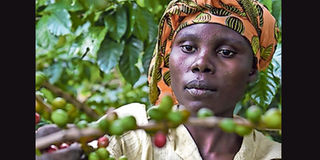Kenyan growers split on coffee ‘fairtrade’ dividends

A coffee farmer in Cheptais, Bungoma County. Most coffee cooperatives and estates in Kenya have subscribed to different certification programmes with the idea that if farmers meet a slew of criteria, they can receive above average market prices. PHOTO | JARED NYATAYA | NMG
What you need to know:
- Farmers are required to meet certain conditions, such as being in a cooperative society, which enforces quality standards.
- According to Fernando de la Cruz, the CEO of Cafe for Change, a coffee social pressure group in the Netherlands, fairtrade had little impact on the welfare of small-scale producers.
- Michael Warui, the CEO Fairview Estate in Kiambu, is full of praises of the system. He says the trick is to follow the rules laid down by certification companies
- Many farmers thought fairtrade would bring money. But the system is mainly interested in fulfilling broad conditions related to child labour, just wages, chemical control and community participation.
More than 30 years ago, pro-farmer programmes started initiatives called fairtrade to force multinationals and consumers see the plight of producers.
Farmers are required to meet certain conditions, such as being in a cooperative society, which enforces quality standards.
These changes are driven by highly informed consumers in the West who demand to know how the coffee they drink is produced and who are ready to pay more. This extra coin is supposed to be routed to compliant farmers.
But queries are emerging on whether these radical ways have added any coin to the pockets of coffee farmers.
According to Fernando de la Cruz, the CEO of Cafe for Change, a coffee social pressure group in the Netherlands, fairtrade had little impact on the welfare of small-scale producers.
The plethora of certification programmes, little change in prices and the inability of farmers to meet requirements has increased confusion. There is also the infiltration of fairtrade systems by multinationals.
Most coffee coops and estates in Kenya have subscribed to different certification programmes. The idea is that if farmers meet a slew of criteria, they can receive above average market prices.
He says farmers in developing countries earn peanuts despite profits for dealers quadrupling in the last 20 years of fairtrade.
Analysts argue that trade and ethics are like water and oil and the idea of “fairtrade” is a contradiction.
“The fees charged annually by certification firms just add to the cost of production,” says Prof Joseph Kieyah, the chairman of the Coffee Reforms Implementation Committee formed by President Kenyatta.
Farmer organisations and estates pay between Sh350,000 and Sh1 million to certification companies.
“Marketing agents do not want farmers to know details of the premium paid from fairtrade coffee,” says Githae Hunyu, the manager Mutheka Cooperative Society in Nyeri.
But not all farmers think fairtrade is a bad idea.
SHADOWY CARTEL
“We get a premium above the market value for coffee sold. There are more benefits compared to the Sh350,000 we pay annually to the Germany-based certification company,” said James Ngatia, the manager of Gikanda Coffee Society in Mathira, Nyeri.
Michael Warui, the CEO Fairview Estate in Kiambu, is full of praises of the system. He says the trick is to follow the rules laid down by certification companies.
“Thanks to fairtrade, we have a branded product, ‘Fairview Coffee’ that we sell all over the world,” added Warui.
His estate sells coffee and “the experience”.
It has also promoted the coffee tourism concept where visitors to his farm experience how coffee is produced and participate in picking.
Many farmers thought fairtrade would bring money. But the system is mainly interested in fulfilling broad conditions related to child labour, just wages, chemical control and community participation.
“We are not allowed to channel the extra money we get from fair trade coffee to individual farmers. The money is for improving quality and things like human rights, cleanliness and obeying labour laws,” said James Ngatia of Gikanda Society, Nyeri. Some farmers think the problem with coffee is local.
“Let’s concentrate on production of more quality coffee. Once there is increased output of such coffee on regular basis, market dynamics will obviously respond and with a guaranteed minimum return for farmers, there is no risk,” Jackson Mugambi, an estate farmer in Meru, said.
These sentiments were echoed by Prof Kieyah who said the government fails farmers by not aggressively marketing Kenyan coffee.
“As for now, we do not know who buys our coffee. It is a shadowy cartel of not more than three international buyers. The government should promote non-traditional markets like China,” he said.
Dr Mbataru is the author of ‘The Coffee Crisis, Old Interest, New Interests and Illusions of Development. Email [email protected]





